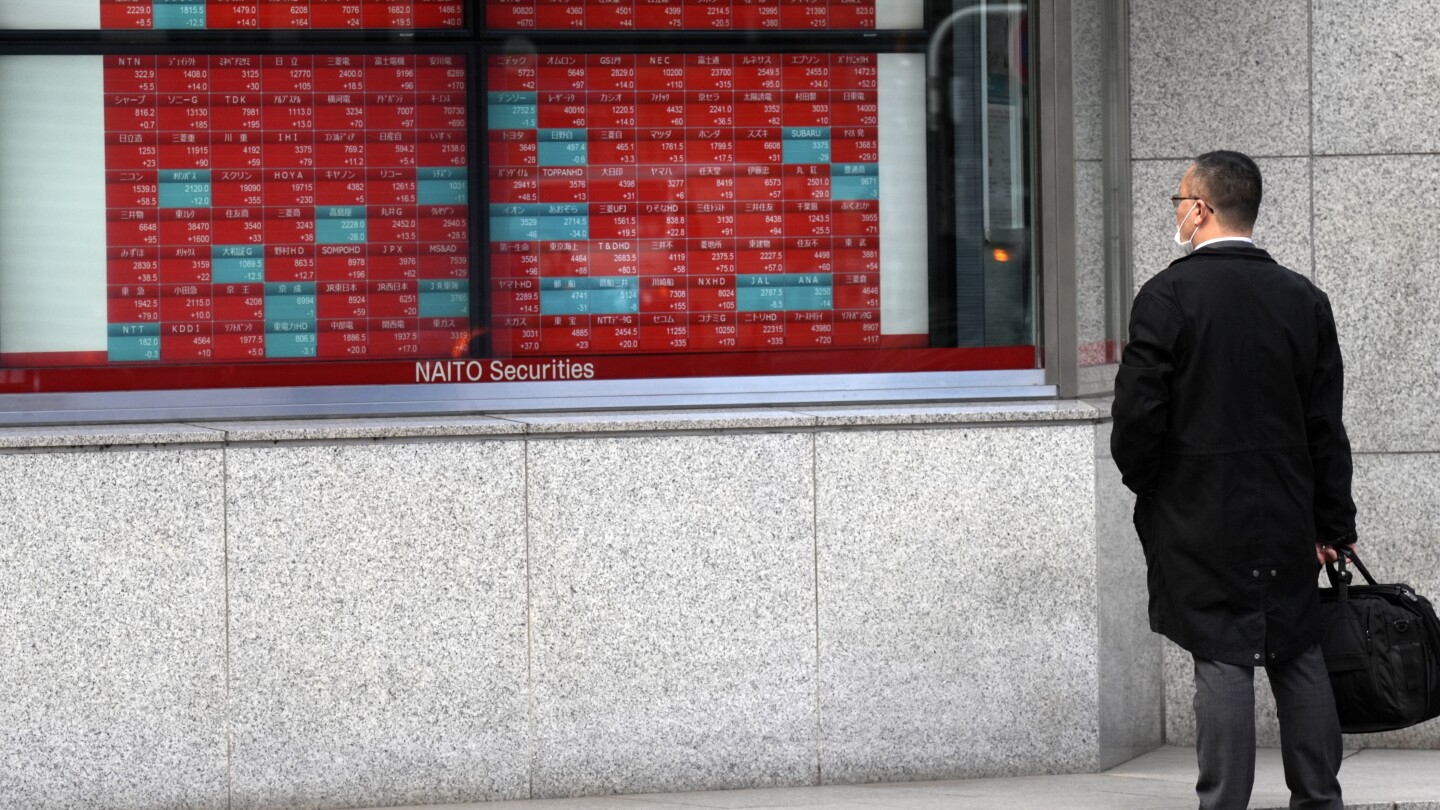TOKYO (AP) — Asian shares mostly rose Wednesday, encouraged by a record rally on Wall Street that was led by technology companies.
Australia’s S&P/ASX 200 rose 0.2% to 7,729.40. South Korea’s Kospi gained nearly 0.5% to 2,694.60. But Japan’s benchmark Nikkei 225 lost its morning gains to slip 0.3% in afternoon trading to 3,054.28.
Hong Kong’s Hang Seng edged up 0.5% to 17,183.94, while the Shanghai Composite was virtually unchanged, down less than 0.1% at 3,054.28.
“The yen has been a notable gainer verses the greenback, with attention focused on the upcoming spring wage negotiations known as ‘shunto,’ as the outcome of this could impact the Bank of Japan’s preference for when to end their policy of negative interest rates,” said Tim Waterer, chief market analyst at KCM Trade.
In currency trading, the U.S. dollar slipped to 147.54 Japanese yen from 147.63 yen. The euro cost $1.0931, inching up from $1.0930.
Speculation is rife that Japan’s central bank is getting ready to end its super-easy monetary policy, which has set interest rates below zero, and start raising rates.
On Wall Street, the S&P 500 jumped 1.1% to top its all-time high set last week. The Dow Jones Industrial Average climbed 235 points, or 0.6%, and the Nasdaq composite jumped 1.5%.
All three indexes began the day with losses after a highly anticipated report on inflation said U.S. consumers paid slightly higher prices than economists expected last month. The worse-than-expected data kept the door closed for long-sought cuts to interest rates at the Federal Reserve meeting next week.
But the inflation figures were still close to expectations, and traders held on to hopes that the longer-term trend downward means the Fed will begin the cuts in June. That helped stock indexes to reverse their losses as the day progressed.
Plus, inflation may not be as hot in reality as the morning’s report suggested.
“January and February are notoriously noisy months for a lot of economic data,” said Brian Jacobsen, chief economist at Annex Wealth Management, who said attention will focus more on the longer-term trend.
The fear is “sticky” inflation that refuses to go down will force the Fed to keep interest rates high, which grinds down on the economy and investment prices. The Fed’s main interest rate is already at its highest level since 2001.
“Another hotter-than-expected CPI reading may breathe new life into the sticky inflation narrative, but whether it actually delays rate cuts is a different story,” said Chris Larkin, managing director, trading and investing, at E-Trade from Morgan Stanley.
For months, traders on Wall Street have been trying to get ahead of the Federal Reserve and guess when cuts to rates will arrive. They have already sent stock prices higher and bond yields lower in anticipation of it.
Through it all, the Fed has remained “nothing if not consistent in doing what it said it would do,” Larkin said. “Until they say otherwise, their plan is to cut rates in the second half of the year.”
The immediate reaction across financial markets to the inflation data was nevertheless halting and uncertain.
In the bond market, Treasury yields initially dropped and then swung higher. The yield on the 10-year Treasury eventually rose to 4.15% from 4.10% late Monday.
The price of gold, which has shot to records on expectations for coming rate cuts, also swung. An ounce for delivery in April ended up falling $22.50 to settle at $2,166.10.
On Wall Street, big technology stocks did heavy lifting. Oracle jumped 11.7% after reporting stronger quarterly profit than analysts expected. Nvidia also rallied 7.2% after a rare two-day stumble. It was the single strongest force pushing the S&P 500 upward on Tuesday.
All told, the S&P rose 57.33 points to 5,175.27. The Dow climbed 235.83 to 39,005.49, and the Nasdaq gained 246.36 to 16,256.64.
In energy trading, benchmark U.S. crude added 62 cents to $78.18 a barrel. Brent crude, the international standard, rose 62 cents to $82.54 a barrel.
















